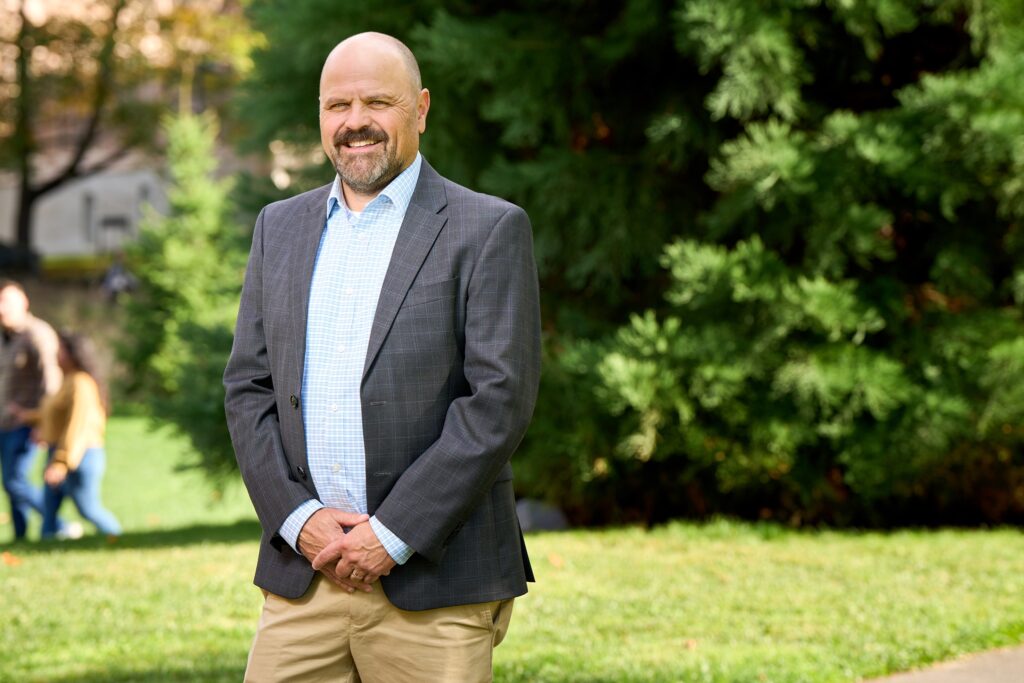From Industry Leader to Faculty: Bringing Practical Expertise into the Classroom
Jody Franich’s curriculum prepares and inspires the next generation of supply chain leaders
At the Foster School of Business, you can meet industry leaders at our guest speaker panels or networking events. But you can also get to know them as your instructors in the classroom. Foster’s location in Seattle provides students with the unique advantage of learning from top research faculty and industry leaders who bring real-world experience into the classroom.
Jody Franich spent more than two decades working at Boeing in positions ranging from Procurement Manager to VP of Enterprise Sourcing. Now, he teaches Foster students in his “Strategic Sourcing & Procurement” class in the Master of Supply Chain Management (MSCM) program. He draws from his extensive industry experience to give students the most practical, proactive, and up-to-date supply chain expertise.

Bridging Theory and Practice in the MSCM Program
Jody has been an instrumental pioneer in the Master of Supply Chain Management program’s evolution for several years, serving on the advisory board where he provided industry insight into the program. As an industry representative, he gave an unfiltered look at the skills that the industry wanted.
Jody connected industry and curriculum, recommending a focus on case study learning and projects that would help students successfully join the workforce. He now brings this same approach to his teaching, providing students with a practical approach to developing strategy and steering the program toward the future of supply chain.
“I talk about specific case studies from my time [in industry],” Jody shared. “I have first-hand knowledge of how we solved complex problems in the past. I create case studies from real-life problems and students enjoy that because it’s much more practical.”
Jody also mentions that he brings real-life examples of failure and mistakes to class discussion, brainstorming with students on what could’ve been done differently and how to adjust. “Students need to have the combination of theory and real-life experience, the synthesis of the two. To understand and apply the theory, they need the practical.”

Real-World Application
Mohammed Alzawad (MSCM 2024) mentioned Jody’s “Strategic Sourcing & Procurement” class as a highlight of his time at Foster.
“Jody would give us case studies that were real examples of things that happened and be transparent about how he handled them,” Mohammed said. “He was also open about how he would handle them differently now and encouraged us to share our own thoughts and ideas as well.” Mohammed emphasized that Jody’s approach made the class material much more tangible. “We weren’t just reading from a textbook; we were always talking about the real world.”
Jody is always focused on teaching the soft skills that lead students to success. “Teamwork and communication are critical in supply chain,” Jody explains. “Supply chain is full of complex technical data. You need to be able to take the data, crystalize it, and communicate it effectively.”
These foundational skills prepare students to adapt to any environment and innovate in the workforce, equipping them to lead the transformation of supply chain. Helping students develop these skills is the foundation of Jody’s projects, assignments, and case studies.
Harnessing his expertise and experience, Jody has transformed the Strategic Sourcing course curriculum. In addition to adding a category management approach, teaching cross-functional leadership, and exploring the Kraljic model (a portfolio sourcing matrix), Jody teaches his students to speak the supply chain language. “I aim to give students the skills that big industry is looking for now,” Jody says.
Part of that is being fluent in industry speak. Jody mentions connecting students with industry professionals and hearing his students speak the same language as the industry executives. They utilize what they’ve learned to keep up in conversations and ask the right questions. This winning combination of technical knowledge and soft skills prepares students to be great interviewees and even better industry leaders.

Seattle’s Industry Advantage
However, a prerequisite to engaging in conversations with industry professionals is being in a city with them. The Foster Master of Supply Chain Management program’s location amongst some of the biggest supply-chain-centric companies in the country makes it possible to practice your newfound industry knowledge (and industry language skills) with real, working professionals.
“Seattle is a very unique place,” Jody muses. “There is no other program like this in the Pacific Northwest. The city is a big draw because of the industry here but also because of its natural beauty and diversity.”
At Foster, students aren’t just taught by some of their field’s highest-ranked research faculty. They’re also taught by career practitioners who infuse their courses with in-depth experiences. The local Seattle industry is an integral part of our curriculum, and our faculty are no exception. When you join the Foster Master of Supply Chain Management program, Seattle’s industry is part of the package. A package that you can’t find anywhere else in the Pacific Northwest. Just ask Jody.
Learn more about the Master of Supply Chain Management here.
